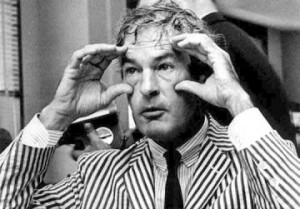Given the current climate of moral panic and the attendant assault on Salvia divinorum — possession of which is now a felony, at last count, in thirteen states, although it is hard to keep up — I thought we might do some thinking about drugs and the law generally.
Let us say that I have been arrested for possession of an illegal hallucinogen. Let us say, too, that I possess that substance, not because it is a sacrament in my church, but because I simply want to experience a hallucinatory mental state. Since I cannot rely on the Religious Freedom Restoration Act, are there any constitutional arguments available to me?
 |
| Timothy Leary |
Here is the rule to keep in mind. Generally speaking, a legislature can constitutionally pass just about any law it wants, as long as the law implicates only what is called a liberty interest — that is, an interest in staying out of prison — and the law passes the rational basis test. That is, to successfully challenge such a law, you would have to convince a court that the law had no rational basis at all — that the legislature was effectively out of its mind when it passed it. Even though that often seems to have been the case, it is difficult to prove in court.
On the other hand, where a fundamental right is involved, the burden shifts to the State to show that the law is narrowly tailored to satisfy a compelling state interest. That is why it is advantageous to frame a challenge to a law prohibiting possession of a hallucinogen as involving a fundamental right rather than a liberty interest.
Free speech is a fundamental right, guaranteed by the First Amendment to the Constitution. So the question becomes: is there a way to bring my possession of a controlled hallucinogen within the ambit of the Free Speech Clause?
As you would expect, the jurisprudence of the Free Speech Clause is complex, extensive, and not entirely consistent. But there is a body of law that talks about free speech not in terms of speech but rather in terms of freedom of thought. And there is enough Supreme Court language out there condemning “government programs of thought control” to indicate that the state may not attempt to control the contents of my mind. The Supreme Court, according to Harvard law professor Lawrence Tribe, “has insisted that the activities actually going on within the head are absolutely beyond the power of government to control.” In Stanley v. Georgia, the Court asserted that the State “cannot constitutionally premise legislation on the desirability of controlling a person’s private thoughts” — and that would include lustful thoughts, racist thoughts, violent thoughts, and, presumably, hallucinatory thoughts as well.
There is, I think, an arguable analogy here between hallucinogens and pornography, which is a mind-altering technology intended to induce or sustain a state of mind that the Court calls prurience — a state of mind characterized, the Court has put it, by “itching, morbid, or lascivious longings.” There are physical instrumentalities for inducing this state of mind, such as books, photographs, and videos. The State may constitutionally prohibit the transport, importation, sale, or mailing of these pornographic instrumentalities, or the public display of pornography itself; but it may not prohibit the private possession of adult pornography in my home.
In Stanley v. Georgia, the defendant had been convicted for possessing pornographic films, which government agents had discovered in his home while searching for evidence of illegal gambling activity. The State argued that it had the same right to protect the minds of its citizens as it had to protect their bodies. But the Supreme Court found it “wholly inconsistent with the philosophy of the First Amendment” to concede to the State “the right to control the moral contents of a person’s thoughts.”
 |
| Larry Flynt |
But suppose we were talking about, not books or films, but rather a plant that induced prurience, called, say, Obscenia prurientis. If I was charged with possession of pornography because I possessed Obscenia prurientis plants, presumably the outcome would be the same. Pruriogenic plants, just like pornographic books and films, are simply an instrumentality for changing the contents of my mind. As long as I don’t transport, import, mail, or hand out these plants to others, the State presumably has no more interest in my private possession of a pruriogenic plant than in my private possession of a pruriogenic movie.
And this ought to be true even though such pornographic instrumentalities as books and films might look to a court more like the sorts of communicative technologies that the Free Speech Clause was originally intended to protect. If the goal is to protect states of mind from government constraints, then the nature of the instrument used to induce the state of mind ought to be irrelevant, whether it is a pornographic video, an electronic brain stimulator, the drug Lawrence Tribe called obscenamine, or our imaginary plant Obscenia prurientis.
Here comes the analogy. Suppose we were talking about, not Obscenia prurientis, but another plant — say, Psychotria viridis — whose purpose and effect was to induce a temporary state of hallucination, just as the purpose and effect of Obscenia prurientis is to induce a temporary state of prurience. On what grounds should the outcome differ? If the State has no permissible interest in my private possession of an instrumentality to induce a mental state of prurience, why should the State have a permissible interest in my private possession of an instrumentality to induce a mental state of hallucination?
In both cases, we have an instrumentality which is illegal to possess, and whose function is solely to create a state of mind — prurience on the one hand and hallucinations on the other — that is disfavored by the State. Yet the Supreme Court has said that the State cannot constitutionally prosecute me for possessing pornography — indeed, for using pornography, in the privacy of my home, to alter my state of consciousness. And this is arguably true even if the pruriogenic instrumentality is a plant. It is hard to see why a hallucinogenic plant should treated differently.
Here, of course, the State would argue that there were other harms — health risks, the chance that the plants would fall into the hands of children, failure to meet international obligations under the United Nations Convention on Psychotropic Substances — whose prevention constituted a state interest sufficiently compelling to outweigh my First Amendment right to control the contents of my own mind. But at least, under this argument, the burden is on the State to show that such harms actually exist, that the harms are so serious that the State has a compelling interest in preventing them, and that total prohibition is the least restrictive way of preventing those harms.
Now that would be an argument worth having.

- Previous Post: Soccer
- Next Post: The Telepathy Meme Again
- More Articles Related to: Ayahuasca, Legal Issues, Sacred Plants



Good stuff Steve!
This is very similar to one of the arguments that has helped a lot of people in Spain when going to court for a case of minor possession, and the logic behind some of he work of Santo Daime to incorporate in Spain too.
Steve,
This piece is copied on the ayahuasca.com forum with some comments from participants that you might want to read:
http://forums.ayahuasca.com/phpbb/viewtopic.php?t=18849
Marco —
Thanks for pointing that out to me. I have taken a look at the discussion, and it raises some excellent points. I will have to put in my own two cents. :-)